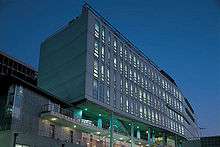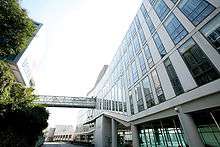Sungshin Women's University
| 성신여자대학교 | |
|
| |
| Motto | Sincerity, Intelligence, Independence |
|---|---|
| Type | Private |
| Established | 1936 |
| President | Shim Hwa-jin, Ph.D. |
Administrative staff | 682 |
| Students | 13,000 |
| Location | Seongbuk, Seoul, South Korea |
| Campus |
Urban 123,395 m² |
| Website | http://www.sungshin.ac.kr/ |
| Sungshin Women's University | |
| Hangul | 성신여자대학교 |
|---|---|
| Hanja | 誠信女子大學校 |
| Revised Romanization | Seongsin Yeoja Daehakgyo |
| McCune–Reischauer | Sŏngsin Yŏja Taehakkyo |
Sungshin Women’s University (Korean: 성신여자대학교) is a private women’s university located in Seoul, South Korea. It was founded in 1936 by Dr. Sook-Chong Lee. During the 1960s and 70s, Sungshin was well known as a prestigious Teachers College in South Korea. Then, in the 1980s, the college was promoted to the status of a comprehensive university. Today, the university comprises ten colleges and five graduate schools with total enrollment of about 12,000 students. In 2006, the university rebuilt the Sungshin Hall to mark the university's 70th anniversary. Also, Sungshin Women's University has succeeded to annex the nursing college of a national hospital, the first event of its kind to happen in South Korea.
History

- 1936.04.28 Sungshin Girls' School is established by Dr. Lee Sook Chong
- 1965.01.13 Sungshin Women's Teachers College is established
- 1972.01.28 The Graduate School is established
- 1979.10.18 The name is changed to Sungshin Women's College.
- 1979.12.05 The Graduate School of Information and Industries is established.
- 1981.07.31 The college is promoted to the status of university.
- 1981.10.20 New establishment and reorganization of courses, new establishment of the colleges of Humanities, Social Sciences, Natural Sciences, Education, and Arts.
- 1982.10.05 The College of Natural Sciences divided and reorganized into the College of Family Sciences (College of Human Ecology)
- 1983.10.29 The Graduate School of Education is established
- 1988.08.30 Dedication of the Woonjung Building.
- 1988.10.29 The College of Arts was divided into the College of Music and College of Fine Arts
- 1994.10.21 The Graduate School of Industry was divided into the Graduate School of Plastic Industry (Graduate School of Arts and Design) and the Graduate School of Information Industry (Graduate School of Cultural Industry)
- 1995.01.10 Dedication of the Soo-Jung Building
- 1995.03.01 The Continuing Education Center is established.
- 1997.10.25 The Graduate School of Human Resource Management is established.
- 1999.02.12 The Ministry of Education's Overall University Evaluation ranked Sungshin's undergraduate program as "excellent" and its graduate program as "most excellent"
- 1995.01.10 Dedication of the Nan-Hyang Building
- 2003.09.21 Dedication of the Media Information Center
- 2003.12.24 Awarded "The ISO 9001:2000 Certification for Academic and Business Administration System"
- 2004.09.18 Selected by the Ministry of Human Resources and Education in 2004 as a "University of Excellence with a Distinctive Project."
- 2005.01.20 The opening of the Family Health & Welfare Center
- 2005.06.30 Selected by the Ministry of Human Resources and Education for two consecutive years as a "University of Excellence with a Distinctive Project."
- 2006.02.20 The Ministry of Education's Overall University Evaluation ranked Sungshin's undergraduate program as "excellent" and its graduate program as "excellent."
- 2006.07.25 Selected by the Ministry of Human Resources and Education for three consecutive years as a "University of Excellence with a Distinctive Project."
- 2006.11.30 Dedication of the Sungshin Building
- 2007.03.01 Establishment of the College of Nursing
- 2007.08.11 Inauguration of the eighth university president, Dr. Shim Hwa-jin
- 2008.04.15 Proclamation of a Vision — Construction of Sungshin Woonjung Campus (SSWU Second Campus)
Academics
Sungshin Women’s University comprises ten colleges (45 departments) and five graduate schools.
Undergraduate Colleges
- College of Humanities
- College of Social Sciences
- College of Law
- College of Natural Sciences
- College of Human Ecology
- College of Nursing
- College of Education
- College of Arts
- College of Music
- College of Convergence Culture and Arts
Graduate Schools
- Graduate School
- Graduate School of Education
- Graduate School of Art & Design
- Graduate School of Cultural Industry
- Graduate School of Finance, Insurance & Banking
Admissions

Admission to Sungshin Women's University is very competitive, with an acceptance rate of less than 5%. Most of the students who enroll at Sungshin are ranked in the top 10% of their graduating class in high school. Also, students are admitted by their specified major instead of into a general freshman pool. Some of the most popular majors offered at Sungshin are psychology, nursing and consumer science & living culture.
Campus
Sungshin Women’s University features newly renovated lecture halls and internal facilities. The campus is equipped with diverse student facilities: bookstore, stationery store, bank, post office, and cafeteria. Also, students are offered convenient one-stop services.
Second Campus (Woonjung Green Campus)
Sungshin has accomplished something all other universities hope to accomplish: the establishment of a second campus in Seoul. The 54,200㎡ Woonjung Green Campus is within 5 kilometers of the Soojung Campus and makes Sungshin the only university with two campuses in Seoul.
The Woonjung Green Campus, with three college buildings and one shared facilities building being surrounded by a vast green area, is designed as an eco-friendly campus with global and futuristic vision. It opened in March 2010 and houses four colleges: College of Natural Sciences, College of Human Ecology, College of Nursing, and College of Convergence Culture and Arts. Woonjung Green Campus, with its organic design to facilitate research experiments and researcher-learner interactions, will brighten Sungshin's future as the training grounds for expert talents.
Woonjung Green campus is a new leap forward for Sungshin Women's University. It will be used as a place of nurturing women with talents demanded in the information society, as a forum for creative education and research, as driving force to build competitive edge for the new Specialization Program, and as foundation for a leap toward becoming one of the world's best private universities. In 2010, Woonjung Campus succeeded the dreams and hopes of the Sungshin community that began in 1936 at the Donam (Soojung) Campus and expands them.
Furthermore, on the lower slopes of Mt. Dobong, the school has built a compound of alpine-style cottages offering all the facilities and amenities where anyone in the Sungshin family can enjoy the beauty of nature as they gather for school and departmental events. The entire setting provides stunning natural views and comfortable lodging and complete kitchen facilities. This is to ensure that the students can enjoy their outdoor activities in a safe and relaxing environment.
Public Transit Access
Sungshin Women’s University is located at a transportation hub, with both campuses near major subway stations.
![]() Sungshin Women's University Station (Soojung Campus);
Sungshin Women's University Station (Soojung Campus); ![]() Mia Station (Woonjung Green Campus)
Mia Station (Woonjung Green Campus)
Special Programs

Sungshin Global Leaders Program
Sungshin Women’s University operates a Global Leaders Program to develop their unique abilities and personal qualities. Sponsored by the school's Korean Women's Institute, this program enables the participants to cultivate the knowledge fundamental to attaining the role of being a leader. This program has been held at the Nan-hyang Cottage in an overnight session twice a year since 2011.
International Elite Training Course
Sungshin Women’s University seeks to develop women with expert foreign language capabilities through its International Elite Training Course. This program was inaugurated in 1994 and selects 120 students from the incoming class and other undergraduates providing them with English courses. The group is organized into classes of ten students, who study for two years in small classes to improve their language ability.
Health and Welfare Specialization
The university plans to produce experts in the areas of elderly care, health management, and stress management at the undergraduate level. It will actively support research on various therapeutic methods, such as art therapy, consultation treatment, and rehabilitation, at the graduate level. Both concentration areas have been selected with consideration to today's aging society and the resulting importance of family welfare.
Culture Specialization
The university will establish various research and educational programs with an objective of educating “Sungshin Intellectuals” for the future. All Sungshin students must take general education courses in the Creative Intellectuals Training Curriculum and can participate in programs like Culture Supporters and Culture Ambassadors.
Sungshin 2015 Strategic Development Plan

The university has established a strategic development plan with help from Samsung Economic Research Institute (SERI) to strengthen its competitiveness under rapidly changing internal and external conditions in the age of intense competition. With supplying the best liberal arts education that brings out the best from the students as our mission, the university will run short- and mid-term programs through 2015 that will help educate sophisticated Sungshin intellectuals with expertise, creativity and courage. For this Sungshin identified seven areas of improvement, including the four core areas of specializations, department and enrollment restructuring, academic affairs, and general education curriculum, and is working on planning and implementation.
Integration of Departments and Enrollment Restructuring
The university integrated redundant departments that are similar to one another to improve academic competitiveness and to maximize investment efficiency. The Department of Athletics and the Department of Leisure Sports became the Department of Sports and Leisure. The School of Computer Information and the School of Media Information were integrated into the School of Information Technology. Evening departments and their classes will be discontinued and the enrollment for the departments will be adjusted after evaluation. The Department of Law becomes the College of Law with increased enrollment.
College and Department Realignment
To go with the health and welfare specialization project, the university decided to concentrate related major programs and departments in one college. As a result, the College of Human Ecology welcomed the new departments of Sports and Leisure and Welfare to its roster.
Improvement in Academic Affairs

English Competency and Graduation Requirements
Each department or major program will establish its own mandatory list of major courses to improve the competency level of its graduates. The number of major courses required for graduation will be increased and the same standard will be applied for the double major program. In addition, certification programs will be introduced for graduation and for English competency.
Comprehensive Academic Advisory System
The university has employed a new, comprehensive academic advisory system to help in academic and career advising. One faculty advisor will be assigned to about 15 first-year students. Also, 15 best faculty advisors will be assigned to 10 Open Major Division students each.
Bachelor’s/Master’s Degree Program
The university established a combined bachelor’s/master’s degree program so that students can receive both the bachelor's and the master's degree in just five years: seven semesters for Bachelor’s and three for Master’s.
General Education Curriculum
Training of “Sungshin Intellectuals”
The university overhauled its General Education Curriculum to properly educate “Sungshin Intellectuals” who will become the faces of the university. The Office of General Education was established to oversee the General Education program and the students in the Open Major Division.
Strengthening of General Education Curriculum
The Office of General Education administers the General Education Curriculum with mandatory and foundation courses. Among the mandatory General Education courses are First-Year Seminar, Foundation of Thinking, English, Sungshin Leadership and Sungshin Culture. These courses are specifically designed to enhance analytic ability, critical thinking, expressivity, and global citizenship qualities. The foundation courses are offered in four domains of Humanities, Social Science, Natural Science, and Art, and they are often interdisciplinary.
See also
- Education in South Korea
- List of colleges and universities in South Korea
- List of Korea-related topics
- Sungshin Women's University Station
External links
Coordinates: 37°35′29″N 127°01′20″E / 37.5913°N 127.0221°E